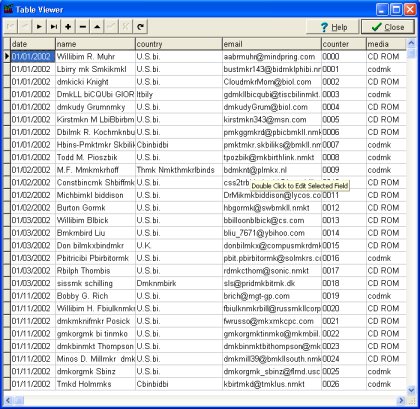20 Best Ideas For Picking Email List Sellers
20 Best Ideas For Picking Email List Sellers
Blog Article
What Should I Think About When Purchasing An Cpa Email Database?
It is important to take into consideration a variety of factors when purchasing a CPA email list. This will guarantee that the list you buy is top-quality that is compliant with legal requirements and applicable to your company's goals. Here are some points to take into consideration: Data Quality and Accuracy
The source of the data: Check whether the list is original. Most reliable providers collect their information from reliable sources, such as directories of professionals, and databases. Avoid lists compiled using scraping and unreliable methods as they may include outdated or incorrect information.
Verification Process - Check whether the list of email addresses was recently validated. This will help reduce bounce rate and ensure you have valid and active email addresses. You should inquire as to how often the list is updated, as CPAs frequently change firms and jobs.
Segmentation and Filters: A great CPA list should offer segmentation options, such as location (city, state, country) or industry specialty (e.g., taxation, auditing or financial planning) and years of experience, or company size. Your campaigns can be made more relevant by using targeted targeting.
2. Conformity with Legal Regulations
Data Privacy Laws Ensure that your email list is in compliance with the relevant local laws and regulations, such as California Consumer Privacy Act, General Data Protection Regulation or General Data Protection Regulation. Lists should contain only email addresses that are legally obtained.
Compliance with the CAN-SPAM Act: For U.S. email campaigns, the list must be in compliance with the CAN-SPAM Act that governs commercial email communications. The list should contain opt-out methods and avoid misleading contents or subject lines. Infractions can be punished with fines and other legal issues.
Opt In Consent: Make sure you've gotten the email address via an opt-in consent. It is a sign that recipients who have agreed to be targeted by marketing from third party. This decreases the likelihood of spam complaints and increases engagement.
3. Provider Reputation
Examine the reputation of the provider. Review case studies, reviews and testimonials to assess the experiences of previous customers. The information from established suppliers is more reliable and accurate.
Transparency: Providers must be transparent in the way they collect information and how often it is changed. If the service provider doesn't explain clearly their methods and procedures, then they're an indication of red.
Customer Support: If you require assistance with list customization troubleshooting or understanding compliance rules it is crucial to be able to provide reliable customer service. Support can save time and help you save time when it comes to campaigning.
4. Cost and ROI
Pricing Models. Different providers have different pricing models. Some charge per contact, while others offer an annual fee or a subscription. Compare the costs and the ROI you expect, while making sure to balance price with quality of the list.
Refund Policy: Discover the policy that allows for replacements or refunds when a number of emails were incorrect or in error. A guarantee can provide peace of mind.
Don't just focus on the cost. If the list isn't high quality, a list with a lower price might look appealing, but it can lead to low engagement rates or a high bounce rate. You should purchase lists that have accurate information and segmentation options.
5. Data Ownership and Usage
Multi-Use Vs. Single-Use: Decide if you plan to buy the list once or make use of it in future campaigns. While a single-use list might be cheaper, owning your list allows you to run longer-term campaigns.
Exclusive vs. Shared lists: Determine if this list of email addresses belongs to you exclusively or is shared by multiple buyers. Shared email lists can result in audience fatigue when recipients receive a flood of emails from different businesses.
6. Data Integration and Format
CRM compatibility: Ensure that the list that you receive is in compatible format with your email CRM or marketing software. Examples include CSV and Excel. It permits easy importation and management of your data.
Ease Of Use: Determine how easily data can be separated and managed following the integration with your system. A well-organized database can improve targeting and personalization.
7. Ethical Aspects
Relevance of content CPAs are often working professionals with a lot of responsibilities. Therefore, it is important to send them relevant and valuable content. Avoid sending unrelated emails that could harm your brand or result in spam complaints.
Avoid sending too many emails: Be aware of how often you send emails to the people on your list. Unsubscriptions can cause unsubscriptions or spam complaints, which can negatively affect your sender's reputation.
Conclusion
Make sure you consider data quality as well as legal compliance and reputation of the company when purchasing the CPA list to make sure your investment is worth it. An effective segmentation strategy, ethical practice, and targeting will help to maximize engagement and increase ROI while preserving an image of a positive brand. Read the expert cpa email list for website examples.
What Should I Consider Before Purchasing The Nurses Email List?
To ensure that your email list is accurate and compliant with the rules, and also useful for marketing campaigns or outreach, you should be aware of a number of aspects. Here are the most important points to consider:1. Data Accuracy and Quality
Source of data: Verify that the email list comes from reliable sources, like healthcare directories or licensing bodies. Avoid lists that are constructed using methods that are not reliable, like data scraping. They could contain outdated and inaccurate information.
Checking and updating frequency: Verify that the provider cleanses and updates the data regularly. To get rid of invalid email addresses, inactive emails, as well as duplicates, a reliable email database must be maintained. Higher data accuracy increases deliverability and decreases bounce rates.
Segmentation Options: A good nurses' email lists should permit segmentation based on criteria like nurses' specialties (e.g. registered nurses or nurse practitioners and critical care nurses) and the location (state or city, region), or employment settings (hospitals, clinics or private practices). Segmentation helps you target your messages more effectively and improves engagement.
2. Compliance with Legal Regulations
Data Privacy Laws - Ensure that your list is compliant with the laws governing data privacy, like the General Data Protection Regulation in Europe, California Consumer Privacy Act in the U.S.A. and other regional or national privacy laws. For your brand to be secured and to avoid penalties you need to collect email addresses legally.
Compliance with the CANSPAM Act: If you're conducting email marketing campaigns within the U.S.A. Be sure that the list is compliant with the CANSPAM Act. This includes clear opt-out methods as well as non-deceptive subject line lines and correct information about the sender. Any violation of these guidelines could result in substantial fines and damaging your business's image.
Opt-In Consent: Only include contacts on your email list who have agreed in writing to be contacted by a third party. This means that nurses listed on the list have expressedly consented to receive emails, which reduces the chance of complaints about spam as well as legal challenges.
3. Provider Reputation
Reputable vendor: Look for an organization that is known for offering accurate and reliable lists. Check out customer reviews, testimonials and case studies to evaluate the credibility and reliability of the service provider as well as the quality of data.
Transparency: The service provider must be transparent about the methods they use to collect and verify information. This could indicate that the data is out of date or isn't reliable if they're unable to explain the sources of their data as well as how it was changed.
Customer Support: Look for an organization that offers solid customer service. A great support team can assist you in solving any issues like questions about compliance or problems in data integration.
4. Cost as well as Cost and Return on Investment (ROI)
Know the pricing structure. Find out if the company has a flat-rate or based on the number of contacts or on the size of the list. Make sure the pricing is in line with your marketing budget and goals.
Ask if the vendor offers plans for a replacement or refund for invalid email addresses. Most reputable vendors offer a replacement or refund in the event of certain percentages of invalid contact or emails that are not delivered. This guarantees that you receive what you purchased.
Make sure you prioritize value over price: It may be tempting to choose an option with an affordable price, however it is best to prioritize quality. A properly-segregated and accurate list will lead to better engagement, as well as a higher return on investment.
5. Ownership of data and use
Multiple-Use or Single-Use? Find out whether a list is designed to be used only for a single time, or if multiple uses are possible. If you're planning to launch campaigns via email that continue over time, investing in lists which you can reuse be a better option.
Shared lists as opposed to. Exclusive and exclusive. shared lists: Choose which list is exclusive to you, or is shared with other customers. Exclusive lists are more efficient because they limit oversaturation and may increase engagement rates.
6. Data Integration and Format
CRM Compatibility: Make sure your list is formatted in a way that's compatible with your Customer Relations Management (CRM) or an email marketing software. Examples include CSV or Excel. This will ensure an easy and seamless integration.
Ease Of Segmentation The list should have been organized in such a way as it is possible that you to filter or divide the data based on different parameters. It will be easier to send tailored messages to specific group of nurses, thus increasing the effectiveness of your campaign.
7. Ethical Besorgnization
Relevance of outreach: Nurses work in healthcare settings and have hectic schedules. It is therefore important to send valuable and pertinent information. Make sure your messages are relevant to their field, such as medical products, continuing education opportunities, or industry advancements. Avoid irrelevant and overly promotional content. This can damage your brand's reputation.
Beware of Spam Practices - Be careful not to overburden your customers with too many emails. Sending excessive or irrelevant emails can result in more unsubscribes or spam complaints as well as damage to sender reputation.
The Final
It is important to consider the data quality and legal compliance of the list's supplier before purchasing an email list for nurses. Make sure the list is segmented, is regularly updated, and is compliant with applicable privacy laws. When you invest in a successful targeted and targeted list, and then sending messages targeted and relevant that you can increase the amount of the number of people who engage and reap the benefits of your investment. Take a look at the pro nurses email list for blog examples.